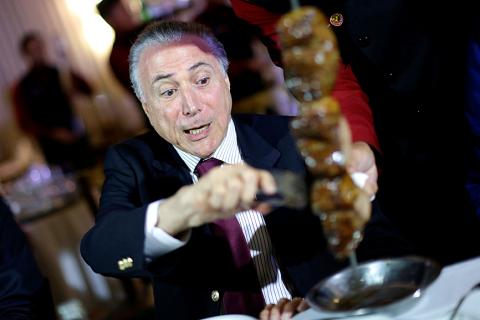Some of the world’s biggest protein buyers are slapping limits on supplies from Brazil as producers in the country become embroiled in a tainted-meat scandal.
China, the largest importer of Brazil’s chicken and beef, has temporarily suspended shipments from the South American country, while the EU and Chile have restricted purchases.
Singaporean authorities said they were monitoring meat shipments from Brazil, as South Korea lifted its short-lived ban on chicken imports from BRF SA after confirming that it never purchased rotten chicken from Brazil.

Photo: Reuters
The move to protect meat supplies comes after Brazilian federal authorities last week said they were investigating evidence that companies — including BRF and JBS SA, the nation’s largest meat producers, bribed government officials to approve the sale of spoiled meat.
Prosecutors allege some sausages and cold cuts contained animal parts such as pig heads, that some meat products were adulterated with cardboard, and that in some cases, acid was used to mask the smell of tainted meat.
Global importers were quick to take action in wake of the scandal. China and Hong Kong were the destination for about a third of the US$5.5 billion of beef shipped from Brazil last year, according to the meat exporters group Abiec.
They accounted for 17 percent of the chicken shipped by Brazil, industry data showed.
China has said it would not accept meat shipments until Brazil provides further clarification on the probe.
Officials have blocked some shipments of beef and chicken from clearing customs at ports, said a person with knowledge of the situation, who asked not to be identified because the information is not public.
Chile also temporarily banned all meat imports from Brazil.
In the UK, the top buyer of Brazilian meat in the EU, regulators stepped up border checks and hygiene inspections on meat from Brazil.
Yum China Holdings Inc (百勝中國), which operates the biggest fast-food chain of more than 7,500 restaurants in China, declined to comment on whether it was affected by the scandal.
McDonald’s Corp, which runs 2,400 outlets, said it does no import meat from the suppliers named in the probe.
The company uses mostly domestic and Australian meat at its restaurants in China, a spokeswoman said.
China edged past Brazil last year as the second-largest consumer of beef and veal, with both nations accounting for about 13 percent of global demand.
South Korean retailers Lotte Shopping Co’s Lotte Mart, E-Mart Inc and Homeplus Co said they are suspending sales of Brazilian chicken at their stores out of caution, even as the country lifted a temporary suspension on chicken imports from BRF.
The lift came after government officials confirmed with Brazil that imports from BRF are from plants that are not contaminated, the South Korean Ministry of Agriculture, Food and Rural Affairs said.

MORE VISITORS: The Tourism Administration said that it is seeing positive prospects in its efforts to expand the tourism market in North America and Europe Taiwan has been ranked as the cheapest place in the world to travel to this year, based on a list recommended by NerdWallet. The San Francisco-based personal finance company said that Taiwan topped the list of 16 nations it chose for budget travelers because US tourists do not need visas and travelers can easily have a good meal for less than US$10. A bus ride in Taipei costs just under US$0.50, while subway rides start at US$0.60, the firm said, adding that public transportation in Taiwan is easy to navigate. The firm also called Taiwan a “food lover’s paradise,” citing inexpensive breakfast stalls

TRADE: A mandatory declaration of origin for manufactured goods bound for the US is to take effect on May 7 to block China from exploiting Taiwan’s trade channels All products manufactured in Taiwan and exported to the US must include a signed declaration of origin starting on May 7, the Bureau of Foreign Trade announced yesterday. US President Donald Trump on April 2 imposed a 32 percent tariff on imports from Taiwan, but one week later announced a 90-day pause on its implementation. However, a universal 10 percent tariff was immediately applied to most imports from around the world. On April 12, the Trump administration further exempted computers, smartphones and semiconductors from the new tariffs. In response, President William Lai’s (賴清德) administration has introduced a series of countermeasures to support affected

CROSS-STRAIT: The vast majority of Taiwanese support maintaining the ‘status quo,’ while concern is rising about Beijing’s influence operations More than eight out of 10 Taiwanese reject Beijing’s “one country, two systems” framework for cross-strait relations, according to a survey released by the Mainland Affairs Council (MAC) on Thursday. The MAC’s latest quarterly survey found that 84.4 percent of respondents opposed Beijing’s “one country, two systems” formula for handling cross-strait relations — a figure consistent with past polling. Over the past three years, opposition to the framework has remained high, ranging from a low of 83.6 percent in April 2023 to a peak of 89.6 percent in April last year. In the most recent poll, 82.5 percent also rejected China’s

PLUGGING HOLES: The amendments would bring the legislation in line with systems found in other countries such as Japan and the US, Legislator Chen Kuan-ting said Democratic Progressive Party (DPP) Legislator Chen Kuan-ting (陳冠廷) has proposed amending national security legislation amid a spate of espionage cases. Potential gaps in security vetting procedures for personnel with access to sensitive information prompted him to propose the amendments, which would introduce changes to Article 14 of the Classified National Security Information Protection Act (國家機密保護法), Chen said yesterday. The proposal, which aims to enhance interagency vetting procedures and reduce the risk of classified information leaks, would establish a comprehensive security clearance system in Taiwan, he said. The amendment would require character and loyalty checks for civil servants and intelligence personnel prior to